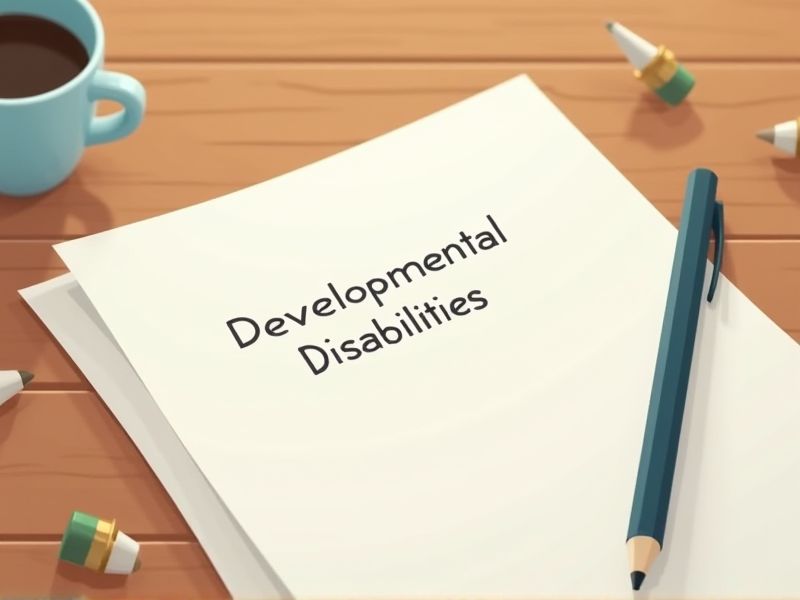
Developmental Disabilities Counselors play a critical role in supporting individuals with diverse needs, which requires specialized skills and knowledge. Obtaining certain certifications ensures these professionals are well-equipped to address complex challenges effectively. Certifications validate a counselor's competency in recognizing and implementing best practices and interventions tailored to developmental disabilities. Here are some essential certifications required for a Developmental Disabilities Counselor.
Certified Developmental Disabilities Professional (CDDP)
Developmental Disabilities Counselors often face complex cases that require specialized knowledge; a Certified Developmental Disabilities Professional (CDDP) offers this expertise through rigorous qualification processes. The certification ensures counselors are equipped with the most current strategies and techniques to address the unique challenges faced by individuals with developmental disabilities. Legal and ethical considerations in treating developmental disabilities are constantly evolving, necessitating counselors to be up-to-date, which CDDP certification guarantees. The certification also enhances the credibility and trustworthiness of a counselor, which can improve client outcomes and advocacy efforts.
Registered Behavior Technician (RBT)
RBTs provide structured and data-driven approaches, which enhance the effectiveness of developmental disabilities counseling through evidence-based practices. Their expertise in observing and interpreting behavior enables more accurate assessments and individualized treatment plans. The hands-on experience RBTs have with applied behavior analysis (ABA) techniques supports counselors in implementing consistent interventions. Collaboration between RBTs and counselors fosters a comprehensive support system, increasing positive outcomes for individuals with developmental disabilities.
Board Certified Behavior Analyst (BCBA)
The role of a Board Certified Behavior Analyst (BCBA) is crucial because they utilize evidence-based practices to effectively address challenging behaviors. Their specialized expertise allows them to design personalized intervention plans, promoting better outcomes for individuals with developmental disabilities. BCBA credentials ensure a high standard of care through rigorous training and adherence to ethical guidelines. By implementing strategic behavior modification techniques, BCBAs enhance the quality of life for individuals and their families.
Certified Autism Specialist (CAS)
A Certified Autism Specialist (CAS) possesses specialized knowledge essential for understanding the unique challenges that individuals with autism face. Their expertise ensures tailor-made interventions, enhancing the effectiveness of support provided by Developmental Disabilities Counselors. Such specialized skills improve the counselor's ability to communicate and engage effectively with clients on the autism spectrum. The CAS credential equips professionals with the tools to build more inclusive and accommodating environments for those with developmental disabilities.
Certified Mental Health Technician (CMHT)
The presence of a Certified Mental Health Technician (CMHT) equips a Developmental Disabilities Counselor with critical expertise in mental health interventions, directly enhancing the quality of care provided. Their training allows for better assessment and management of behavioral challenges often present in developmental disabilities, which leads to improved client outcomes. The CMHT's skills in therapeutic communication and crisis intervention contribute to maintaining a safe therapeutic environment, reducing the likelihood of escalations. In depth understanding of mental health medication and side effects assists in collaborating effectively with healthcare teams, ensuring more holistic client care.
Crisis Prevention Intervention (CPI) Certification
Crisis Prevention Intervention (CPI) certification equips Developmental Disabilities Counselors with techniques to handle potentially volatile situations, reducing the risk of harm. Certified counselors demonstrate enhanced communication skills that de-escalate conflicts, promoting a safer environment for both clients and staff. The certification underscores a counselor's commitment to evidence-based strategies and professional development, which is crucial in fostering trust with clients and their families. Certifications like CPI are increasingly required by organizations to ensure compliance with safety regulations and best practice standards in care settings.
Mental Health First Aid Certification
Mental Health First Aid Certification equips Developmental Disabilities Counselors with essential skills to identify signs of mental health issues in their clients, enabling timely intervention. With this certification, counselors can confidently manage crises, reducing potential harm and improving client outcomes. It enhances communication abilities, aiding in the understanding of both verbal and non-verbal cues from individuals with developmental disabilities. Having certified counselors ensures adherence to best practices, fostering an environment of trust and effective support for those with developmental needs.
CPR and First Aid Certification
Certification in CPR and First Aid equips a Developmental Disabilities Counselor with essential skills to manage medical emergencies effectively. In crisis situations, prompt and knowledgeable intervention can prevent escalation and reduce risks to individuals with developmental disabilities. Proper certification fosters a safer environment by ensuring counselors are prepared to respond to physical distress or injury. The ability to provide immediate care enhances trust between counselors, individuals, and their families, bolstering confidence in support services.
Trauma-Informed Care Certification
Trauma-Informed Care Certification equips counselors with the knowledge to understand the complex interplay between trauma and developmental disabilities, enabling more effective support for clients. This certification helps in recognizing and integrating strategies that mitigate the negative impact of trauma on individuals with developmental disabilities. Counselors with this expertise can tailor interventions that foster a sense of safety, empowerment, and resilience in clients. Certified professionals are better prepared to create inclusive environments that acknowledge and address the unique needs of this population.
Certified Case Manager (CCM)
Certified Case Managers (CCMs) improve the efficiency of care for individuals with developmental disabilities by coordinating necessary resources and services. Their expertise in healthcare systems and social services ensures clients receive comprehensive and tailored support, ultimately advancing their well-being. The specialized training of CCMs allows them to identify gaps in service delivery and advocate effectively for client needs. By streamlining communication between families, healthcare providers, and service agencies, CCMs enhance the overall quality of care.
Summary
When you obtain certifications as a Developmental Disabilities Counselor, you enhance your professional credibility and skillset. This often leads to increased trust from clients and improved therapeutic outcomes. Your expanded knowledge base can open doors to advanced career opportunities. Employers may also recognize your expertise, potentially resulting in higher compensation.
